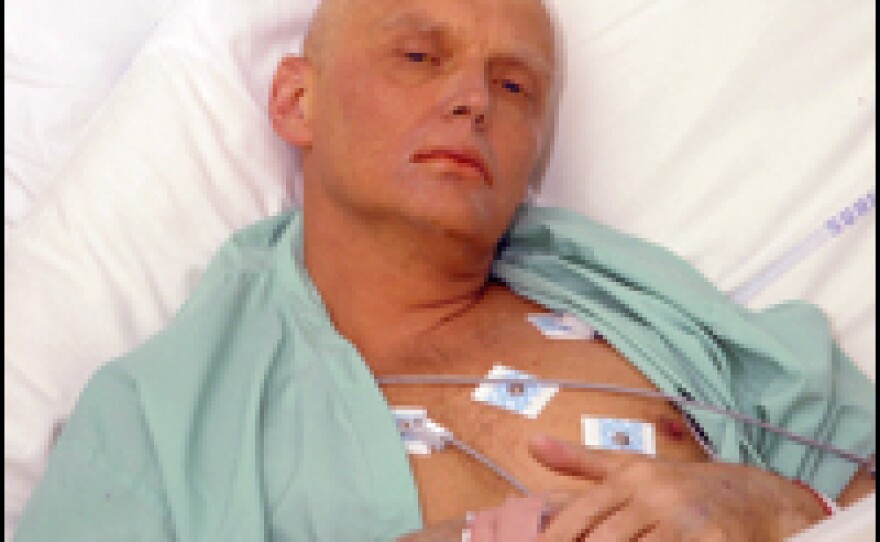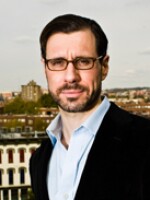


A new chill has settled over Russia: The recent killings of some of the Kremlin's most prominent critics have sent a shudder through the country's marginalized human rights community.
Tanya Lokshina, a member of the new generation of human rights campaigners in Russia, is head of the Demos Center. She says several years ago, she first noticed similarities between what she is doing and what dissidents under the Soviet Union had to go through.
"I'm 30 years of age and a young professional, and I'm suddenly telling my staff what they have to do if the KGB walks in," she says. "This belongs in books. This shouldn't be happening."
Lokshina says the murder of journalist Anna Politkovskaya in the elevator of her Moscow apartment building in October was a turning point for her. Politkovskaya's investigations into atrocities in Chechnya had made her a household name. Lokshina says her murder marked something new for Russia.
"When Anna was gone, we all realized to what extent everyone else is vulnerable," says Lokshina. "Because if they could do it to her, then everyone else is just completely unprotected."
Last year, the head of a nongovernmental organization that tracked abuses in Chechnya was charged with inciting ethnic hatred in what Lokshina calls a "typical political trial." The Supreme Court recently upheld the group's closure.
These days, opposition groups are usually denied permission to stage demonstrations in Russia. When they do take place, riot police on the streets far outnumber protesters.
Last winter, the Kremlin issued a bill increasing its control over human rights groups and other NGOs. The bill makes registration more difficult, restricts foreign funding for perceived political activities and requires such groups to report their activities in detail.
As legislators sped the bill to a yes vote, a handful of activists tried to protest outside the parliament building next to Red Square. But not for long: Police soon bundled the demonstrators off into nearby vans.
At a rally last September marking the anniversary of the Beslan school siege, police arrested leading rights activist Lev Ponomaryov. He spent three days in jail.
In his cramped Moscow offices, Ponomaryov says the former KGB officers that now hold top government posts have revived Russia's police-state culture.
"They're not able to conduct a political dialogue. They can only work according to the principle 'I'm the boss and you're the underling,'" Ponomaryov says. "It's the way the military functions, and they've made the whole country like that."
The highly publicized murders of some of the Kremlin's top opponents have recently invited comparisons to KGB practices during Soviet times. In November, former KGB officer Alexander Litvinenko died in London after being poisoned by polonium-210, a radioactive substance.
Litvinenko was a loud critic of President Vladimir Putin, and he blamed the president for his poisoning from his deathbed, a claim the Kremlin strongly denied.
Things were much different in the 1980s and '90s, when Ponomaryov organized mass demonstrations of hundreds of thousands of people who protested Communist Party policies and helped bring down the Soviet Union.
Now, he says, rights activists have almost no public support and increasingly less money, even from the Western foundations that are among the only remaining contributors.
"People are afraid of funding human rights activities in Russia. Businesses are afraid, and Western organizations are leaving," Ponomaryov says. "On one hand, they're being squeezed by the authorities. On the other, they just don't want to get involved themselves. It's simply too difficult."
Ponomaryov isn't the only person to say that Russia is not a free country. Other dissidents and international organizations, like Freedom House in Washington, rank Russia low or at the bottom on international scales of political and human rights.
But most rights activists say despite their difficulties, they are still allowed to work. Lyudmila Alexeyeva is a dissident from the Brezhnev era in the 1970s. She helped found the Moscow Helsinki Group, which she now chairs.
Alexeyeva says things are not as bad as the days when most dissidents were jailed, put into psychiatric wards or forced to emigrate.
"Back then, if you decided to publicly criticize official ideology, it meant you first had to decide to pay for it with your freedom," she says.
Now, Alexeyeva says the authorities are more subtle. Last year, she was accused of involvement with British intelligence.
"It was all done to blacken our reputation," she says. "The accusation was based on false documents, and later, the lies were never punished."
Nationalist groups have also threatened Alexeyeva. One put her on the top of a list of Russia's biggest enemies. Alexeyeva says the Kremlin has encouraged extremists with its nationalistic policies, such as the mass deportations of Georgians and police raids against foreigners working in street markets.
But the 80-year-old says she is not afraid of the threats against her.
"If I were to be killed, no one would say, 'Oh what a tragedy, she was cut down so young,'" Alexeyeva says. "But I also think it's better to go doing what you want."
Many believe the deaths of Politkovskaya and Litvinenko were intended to warn dissidents to stop criticizing the authorities. But human rights activists say if that was the plan, it hasn't succeeded, and that they intend to press on with their work.
Copyright 2022 NPR. To see more, visit https://www.npr.org. 9(MDAzMjM2NDYzMDEyMzc1Njk5NjAxNzY3OQ001))







